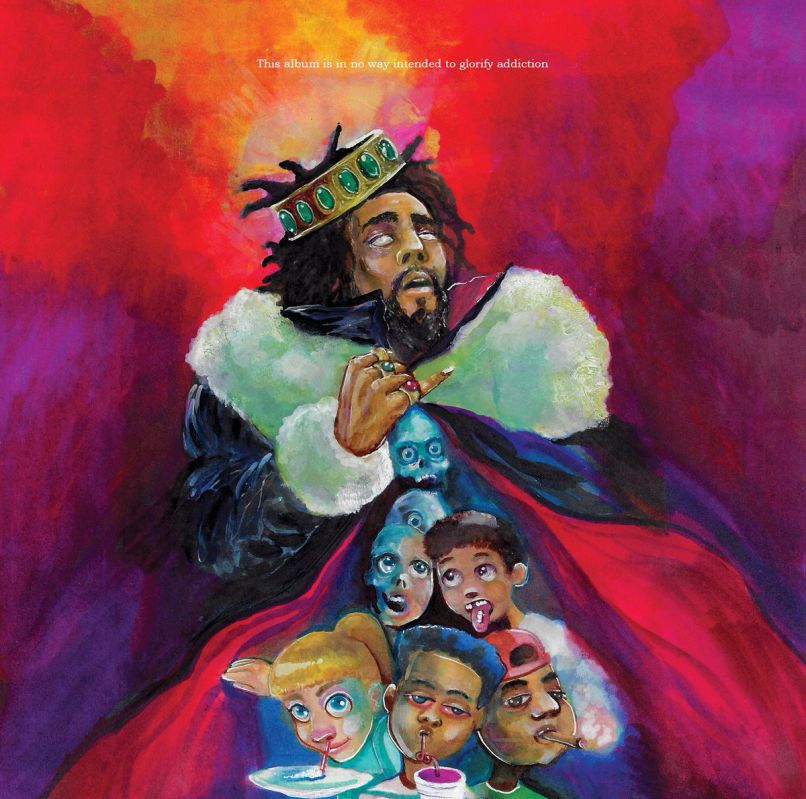World overdoses on J. Cole’s “KOD”
Rapper shatters records with latest album drop
Rapper J. Cole released his latest album, “KOD,” on Apr. 20, his fifth album to rank number one on the Billboard 200 chart.
The album covers many themes, but, as one can assume from the release date, album cover, and title, its main focus is on the younger generations relationship with drugs.
In the song “1985,” he calls out SoundCloud rappers like Lil Xan and Lil Pump for their questionable motives. He raps, “Cause that’s exactly what’s expected when your skin black / They wanna see you dab, they wanna see you pop a pill / They wanna see you tatted from your face to your heels.”
J. Cole expresses his doubt of the legitimacy of the lifestyles these rappers promote from the perspective of a slightly older rapper.
In the last lyrics of the song “KOD,” it’s likely he is threatening the same group of rappers when he says “Just remember what I told you when your s*** flop/In five years you gon’ be on ‘Love & Hip-Hop.’”
He hints many times that he believes the Xanax genre of hip-hop, as well as the lifestyle and drug use that comes with it, is a passing, although dangerous, fad.
He also insinuates that in a couple years the popularity and wealth of this group will dry up and they’ll be stuck on reality T.V. shows like “Love & Hip-Hop.”
In the song “FRIENDS,” he takes responsibility for contributing to the drug crisis himself, rapping “My database of narcotics / It’s growing long … I wrote this s*** to talk about the word addiction…What I’m trying to say is the blame can go deep as seas / Just to blame ’em all I would need like 20 CDs … Type of s*** that normally would call for therapy.”
Admitting he’s at fault as well, the rapper expresses his disappointment with himself and that he can not just put the blame on others.
In fact, J. Cole tweeted out that the title has three separate meanings. KOD stands for “Kids on drugs,” “King Overdosed” and “Kill our Demons.”
The rapper finished the tweet saying he would “leave the rest of the album to your interpretation.”
All three meanings of the title can be seen in the albums’ bright cover art, which was released a day before the album, along with a song list.
In the image, J. Cole wears a cloak as the overdosed king. Three faces of “kids on drugs” sit on the bottom of his robe, each doing a different drug associated with rap artists (presumably marijuana, lean, and cocaine). Above are skeleton faces, some part human, which make up the demons’ portion of the title.
Similar to Kendrick Lamar’s latest album, “Damn,” “KOD” has less catchy beats and choruses, and instead opts for more meaningful and thoughtful lyrics. Aside from the song “KOD” and a few others, it’s unlikely radio stations would play this album, as opposed to the massively played “2014 Forest Hills Drive.”
Yet, the album gained 64.5 million downloads in its first 24 hours in just the United States. This broke the record previously held by Drake and shows how heavily anticipated the album was.
KOD’s title track alone shattered Spotify’s one day streaming record with 4.2 million downloads, dethroning Taylor Swift’s “Look What You Made Me Do.”
This was J. Cole’s fifth studio album, with his last album, “For Your Eyez Only”, dropping in 2016. His talent has always been evident, but he officially rose to superstardom with the the release of “2014 Forest Hill Drive”, famously going double platinum without features, and containing huge hits such as “No Role Modelz,” “Wet Dreamz,” “G.O.M.D.” and “Love Yourz.”
It will be interesting to see which style he pursues in the future. With each of his last three albums coming two years after the last, it is likely we won’t know the answer until 2020.







































